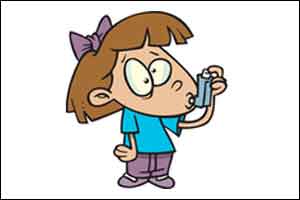- Home
- Editorial
- News
- Practice Guidelines
- Anesthesiology Guidelines
- Cancer Guidelines
- Cardiac Sciences Guidelines
- Critical Care Guidelines
- Dentistry Guidelines
- Dermatology Guidelines
- Diabetes and Endo Guidelines
- Diagnostics Guidelines
- ENT Guidelines
- Featured Practice Guidelines
- Gastroenterology Guidelines
- Geriatrics Guidelines
- Medicine Guidelines
- Nephrology Guidelines
- Neurosciences Guidelines
- Obs and Gynae Guidelines
- Ophthalmology Guidelines
- Orthopaedics Guidelines
- Paediatrics Guidelines
- Psychiatry Guidelines
- Pulmonology Guidelines
- Radiology Guidelines
- Surgery Guidelines
- Urology Guidelines
Flu vaccination reduces asthma attacks in kids

In a new study in the journal Pediatrics, Francine Ducharme, a pediatrician and clinical epidemiologist at CHU Sainte-Justine, and colleagues make a strong case for vaccinating kids with asthma against flu. The researchers found that those with influenza or parainfluenza turned out to have a 37-percent or more chance of not responding to Asthma treatment, compared to 13 percent for children without a virus.
Asthma and respiratory viruses don't go well together. Weakened by the common cold or the flu, a person suffering an asthma attack often responds poorly to emergency treatment; some must be hospitalized. This is especially true for preschoolers.
But what if there were a simple solution to help ward off the double whammy of an asthma attack and a respiratory virus? Well, there is one: to prevent getting sick, asthmatics can get an annual flu shot.
Unfortunately, however, only about 60 percent do - but that might change.
"These kids should get their flu shot and they should get it systematically - it's worth it," said Ducharme.
"We now know that if these kids get the flu the risks are very high that emergency treatment for an asthma attack will fail," said Ducharme. "Instead of having an overall 17-percent risk of treatment failure, with flu their risk rises to almost 40 percent."
The study is based on the national DOORWAY (Determinants Of Oral Corticosteroid Responsiveness in Wheezing Asthmatic Youth) study that Ducharme and colleagues conducted between 2011 and 2013 with funding from the Canadian Institutes of Health Research. That study looked at close to 1,000 children treated for moderate or severe asthma attacks in emergency rooms at Sainte-Justine, the Montreal Children's Hospital, and three other Canadian hospitals. Nose swabs were taken and analyzed to see if the children also had the flu or other respiratory viruses when they came to the ER.
It turned out almost two-thirds did. Yet when the kids with respiratory viruses were given the standard treatments for their asthma attack - oral corticosteroids and inhaled bronchodilators - 20 percent didn't respond and in most cases needed to be hospitalized. Those with influenza or parainfluenza turned out to have a 37-percent or more chance of not responding to treatment, compared to 13 percent for children without a virus. Failure was also high in kids with respiratory syncytial virus (RSV).
By contrast, kids with strains of human rhinoviruses (HRVs) - the usual cause of the common cold - did respond well to treatment for their asthma. To the researchers, this was very reassuring, as HRVs are the most frequent trigger of asthma attacks necessitating a visit to the ER.
"This is the first time we've been able to disentangle the risk of non-response to asthma treatment with the presence of specific viruses - specifically, influenza and rhinovirus," said co-author Caroline Quach, an associate professor of microbiology and infectious diseases at UdeM, chair of the Quebec Immunization Committee and chair of the National Advisory Committee on Immunization of the Public Health Agency of Canada. "The more than 20-per-cent higher absolute risk of treatment failure in flu cases is very significant."
There's also a simple solution - but with hurdles, she added.
"Influenza is the only respiratory virus that is vaccine-preventable. Granted, it's at best only 50-percent efficacious, but that's no reason for kids with asthma not to get vaccinated yearly, in the fall, before flu season starts. We can start as young as six months of age. Asthma is not usually diagnosed that early, but in Quebec, every child who is diagnosed with asthma is eligible for influenza vaccination. The problem is that not many parents are prevailing themselves of the opportunity."
A major reason is an access. Getting a flu shot often means an extra trip to a CLSC or public-health clinic, and not all parents can or want to take the time to get it done.
"It's an additional step, so what we're trying to promote is that kids get vaccinated where they get care - at Sainte-Justine, for example, where children can be vaccinated on site at our asthma, respiratory or general pediatric clinics. "
From 2012 to 2014, Quach and her student Joanna Merckx, then a McGill clinical fellow in pediatric infectious diseases, ran a free flu vaccination clinic at the Montreal Children's Hospital, immunizing 2,640 kids who had high-risk conditions like asthma, and concluded the easy access worked.
"It was very well-accepted," Quach recalled. "It was easier to catch those children who were coming in anyway for their visits."
Despite the fact that, as the study said, "very little is known about the impact of consecutive and repeated use of LAIV (flu vaccine administered via nose spray) and IIV (via injection) in the population," the message she and her colleagues have for public-health policy makers is unequivocal: make it easy for parents to get their children vaccinated, and encourage them to do so.
"Everybody who has an asthmatic child should hear that influenza is bad news - the child might have an attack that needs hospitalization," Quach said. "They need to ask for the flu vaccine yearly."

Disclaimer: This site is primarily intended for healthcare professionals. Any content/information on this website does not replace the advice of medical and/or health professionals and should not be construed as medical/diagnostic advice/endorsement or prescription. Use of this site is subject to our terms of use, privacy policy, advertisement policy. © 2020 Minerva Medical Treatment Pvt Ltd